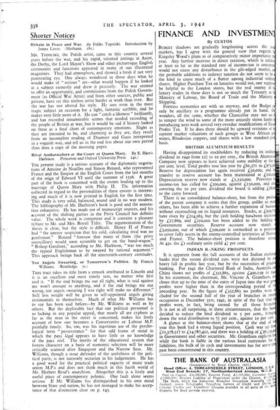FINANCE AND IN VESTMEN
By CUSTOS
BUDGET shadows are gradually lengthening across the s markets, but I agree with the general view that regards Kingsley Wood's plans as of comparatively minor importance year. Any further increase in direct taxation, which is unlik at least so far as the standard rate of income-tax is concern would not cause any disturbance in the gilt-edged market, the probable additions to indirect taxation do not seem to be the kind to cause much of a flutter among industrial ord. shares. Higher Purchase Tax on luxuries would not, one sup be helpful to the London stores, but the real enemy of luxury trades in these days is not so much the Treasury as Ministry of Labour, the Board of Trade and the Ministry Shipping.
Fortress economics are with us anyway, and the Budget only be ancillary to a programme already put in hand. wonders, all the same, whether the Chancellor may not see to temper the wind to some of the more unjustly shorn lambs introducing next week several very overdue modifications of Ex Profits Tax. If he does there should be upward revisions of current market valuations of such groups as West African g mines, Rhodesian coppers, and shares with a low standard p basis.
BRITISH ALUMINIUM-RESULTS Having disappointed its stockholders by reducing its ord. dividend in 1940 from 12i to xo per cent., the British Alumini Company now appears to have achieved some stability at the per cent. level. Total profits rose last year by £61,371 to £973,5: Reserve for depreciation has again received £50,000, and transfer to reserve account has been maintained at Doo, Depreciation reserve now stands at £1,550,000. Provision f income-tax has called for L200,000, against £150,000, and aft covering the 10 per cent, dividend the board is adding £28 to the carry forward.
There is no consolidated balance-sheet, but from the posi of the parent company it seems that this group, unlike so others, has been able to achieve a further expansion of bus without encroaching on its liquid resources. Stocks, at £959, have risen by £214,563, but the cash holding has•been increa by £27,869, and L2I0,000 has been added to the holding Government securities. Reserve -account now stands £3,050,000, out of which £500,000 is earmarked as a provis to cover fully assets in the enemy-controlled territories of Nom and France. The balance-sheet position is therefore stro At 43s. the Lx ordinary units yield 4.1 per cent.
INDIAN BANKING PROSPECTS
It is apparent from the full accounts of the Indian exchan banks that the recent dividend cuts were not dictated by heavy fall in profits last year, but by the necessities of prud banking. For 1941 the Chartered Bank of India, Australia China shows net profits of £352,865, against £400,159 in In his statement, the chairman, Mr. Vincent A. Grantham, closes that up to the time of the entry of Japan into the war g profits were higher than in the corresponding period of t preceding year. In the figure of £352,865 no profits were cluded for the second half of the year of branches in en occupation at December 31st, 1941, in spite of the fact that profits were, in fact, being earned by all those bran It is not at all surprising, in these circumstances, that the • decided to reduce the final dividend to 5 per cent., brik down the total distribution to 7i per cent., against zo per cent. A glance at the balance-sheet shows that at the end of year this bank had a strong liquid position. Cash was up f £11,578,517 to D4,787,422, and there Was a holding of £36,535, in Government and other securities. Mr. Grantham explains while the bank is liable in the various local currencies for liabilities, the bulk of its cash and investments has for some past been concentrated in this country.


























 Previous page
Previous page